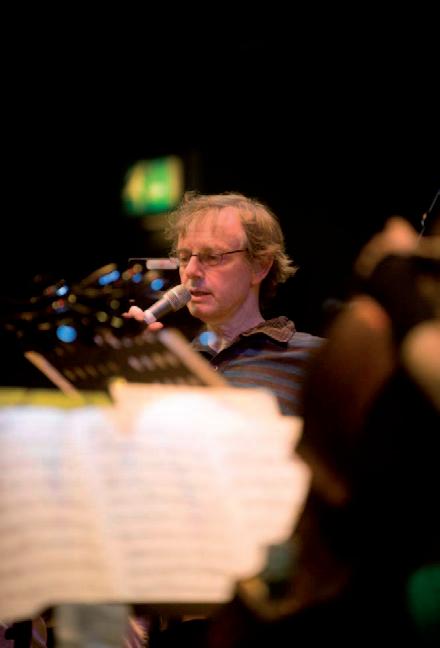michaelmarra mcfalls chamber mr

recorded live on tour 2010


recorded live on tour 2010
1 Intro [1:36]
2 The Lonesome Death of Francis Clarke [3:56]
Michael Marra arr David McGuinness
3 The Slave’s Lament [4:23]
Robert Burns arr Robert McFall
4 Intro [1:26]
5 Hamish (the goalie) [3:49]
Michael Marra arr Robert McFall
6 The Beast [4:29]
Michael Marra arr Robert McFall
7 Intro [0:27]
8 Niel Gow’s Apprentice [3:04]
Michael Marra arr David McGuinness
9 Intro [0:52]
10 Happed in Mist [3:49]
Michael Marra arr Robert McFall
11 Intro [0:27]
12 The Clock [3:49]
Michael Marra arr Robert McFall
13 Monkey Hair [4:04]
Michael Marra arr Robert McFall
Recorded live in May 2010 in locations around Scotland and the north of England
Producer: Paul Baxter
Engineer: Ben Seal
24-bit digital mixing: Paul Baxter & Ben Seal
24-bit digital mastering: Paul Baxter
Photography: Marc Marnie
www.marcmarnie.com
Design: John Christ Delphian Records Ltd – Edinburgh – UK www.delphianrecords.co.uk
Schenectady Calling Peerie Willie Johnson [2:48]
Michael Marra arr Robert McFall
Intro [1:08]
Pius Porteous [3:08]
Michael Marra arr Robert McFall
Intro [0:17] 19 Green Grow the Rashes [4:48]
Robert Burns arr David McGuinness
20 Intro [2:08]
21 Farlow [3:52]
Michael Marra arr Robert McFall
22 Intro [1:08]
23 Frida Kahlo’s visit to the Tay Bridge Bar [3:39]
Michael Marra arr Robert McFall
Michael Marra
vocals, piano (tracks 2, 5, 6, 8, 10, 12, 13, 15, 17, 19, 23), guitar (tracks 3 and 21)
Claire Sterling violin
Robert McFall violin (tracks 5, 6, 8, 10, 12, 13, 15, 17, 19), mandolin (tracks 2, 3, 21, 23)
Brian Schiele viola
Su-a Lee cello (tracks 3, 5, 6, 8, 10, 12, 13, 15, 17, 21, 23), musical saw (tracks 2, 17, 19)
Rick Standley double bass (tracks 2, 3, 6, 8, 12, 15, 19, 23), bass guitar (tracks 5, 10, 17, 21)
Phil Alexander accordion (tracks 5, 8, 12, 17, 21, 23), harmonium (tracks 3, 10, 13, 23), glockenspiel (tracks 2, 6, 19), backing vocals (tracks 2 and 19)
Dundee faces south across the Firth of Tay, its long bridges snaking across the water to Fife. Turning to the right, the city looks along the road that leads to Perth, its posh neighbour to the west. Northwards, behind its back, between Dundee and Aberdeen, are areas of rich farming land; while, most significantly, to the East, over its left shoulder, beyond the mouth of the estuary, is the sea. It was this keen eastward glance, towards the possibilities of the world beyond, which put Dundee at the centre of empire and commerce, as well as jute manufacture (the raw jute coming from India) during the nineteenth century. Dundee has adopted Captain Scott’s ship, the Discovery, as its symbol. The ship itself sits in pride of place on the water front – you can’t help but see it on your way into town.
Michael Marra grew up in the Lochee district of the city, an area where, in the past, Cox’s mill was situated. Michael’s ancestors came to Dundee from Ireland two generations back, drawn by jobs in both the jute and shipbuilding industries. His great uncle Francis Clarke worked on the building of, among other ships, the Discovery itself. The Lonesome Death of Francis Clarke is a song addressed to this great uncle. Like many Dundonians, his line of work took him out to far flung parts of the world and this song describes his death in the Yukon Territory, estranged and far from his family.
Niel Gow’s Apprentice is a gentle dig at another rover, albeit of more recent times, Dougie MacLean. As a young man Dougie had grumbled to Michael about the extensive touring schedule he was forced to endure as a result of his success, at a time when fellowex-band-member Michael was living most of the time, as he explains in his introduction to the song, in one room. In subsequent years Michael found himself on the road a fair bit himself, though consistently basing himself in or around Dundee. Farlow was written while he was on a concert tour of British Columbia, somewhat in the footsteps of his great uncle.
Dundee has for many years, as well as producing many musicians, been host to a vibrant theatre tradition, and Michael Marra has been involved in a number of productions as music director, and even as actor. The Beast is an example of a song he wrote for the theatre – for a Christmas production of Beauty and the Beast co-written with Liz Lochhead in 2001.
Marra’s songs are keenly focused. His congenial introductions, as well as being entertaining, are often vital scene setters. We’ve chosen to include some examples of them on the recording. Mr McFall’s Chamber originally collaborated with Michael through an event at Edinburgh’s Bongo Club in 2006, and has built up a programme with him which the group has now toured. These live
recordings were made on that tour. We hope that the inclusion of some of the introductions will also help to recreate the atmosphere of those performances.
The songs range widely in subject matter. Some, such as Schenectady Calling and Niel Gow’s Apprentice, are tributes to fellow musicians; some, such as Monkey Hair and Happed In Mist, are inspired by Scottish literature (both of these by Lewis Grassic Gibbon’s A Scots Quair trilogy); some, such as Farlow and The Lonesome Death of Francis Clarke, are set in far-away places overseas; others, such as Frida Kahlo’s Visit to the Tay Bridge Bar and Hamish (the goalie), are set firmly among the landmarks of Dundee itself – the bridge, Invergowrie Bay, Tannadice Park, the Perth Road. The Clock focuses on the interrupted nature of social interaction in Tobermory on the island of Mull, circumscribed as it often is by the ferry timetable; Pius Porteous explores the imaginary love-life of a cat of that name. The disc also includes two Robert Burns’ songs; Green Grow the Rashes O is a song in praise of women; The Slave’s Lament was written in 1792 and was inspired by a close view of a slave ship in Dundee harbour.
The songs presented here are like snapshots –a Mennonite woman, having left her garrulous husband, takes her first steps towards life as a single person; two cats contemplate, with exhilaration, a tumble in the cornfield; an
African slave, exhausted and despairing, longs for ‘friends most dear’ and the warm delights of his native Senegal. Many of the snapshots are of Scottish life past and present – a ploughman from the Mearns hallucinates and walks, disastrously, towards a vision of his wife in the middle of a First World War battle; a folk musician in Shetland hears jazz for the first time on a home-made crystal set; a transported and imaginary Frida Kahlo dances in the moonlight with Dundee painter James Howie outside the Tay Bridge Bar in Dundee; the wife of a Scottish minister (in Monkey Hair ) refuses to bear him children, lest she again has to go through the agony of bereavement in some future war; Grace Kelly, wearing a white turban, sits behind a Taylor Brothers’ Coal advertising board at a Dundee United match. No careless generalisations or easy emotionalism here, no bleary nationalism, no pop clichés – rather, a quizzical exploration, at times fanciful, sometimes amusing, sometimes poignant, of particular moments, situations and juxtapositions. A keen glance.
© 2010 Robert McFall
2 The Lonesome Death of Francis Clarke
There is a place out in the Yukon
And lying there a shipwright’s bones
By his side his adze and compass
And by his feet there is a curling stone
Lying by his feet there is a curling stone.
A fountain pen lies in his waistcoat
Although they found no written farewell; He died on a night that was cold as his family,
Oh, it was icy at the gates of Hell
Surprised that it was icy at the gates of Hell.
Fare thee well, brave Uncle Francis
When the snow flakes fall I will sing the blues
And when I think of how you left this world I will remember how the world left you.
They say he fell for an Indian maiden Who was more lovely than mere words could tell He lay in her arms and they bathed in the moonlight; He softly sang of the Bailieborough Belle He sang to the maiden of the Bailieborough Belle.
Fare thee well, brave Uncle Francis…
And who among us would still say
‘I’ll not forgive until my dying day,’ Between the Earth and the Sky above There must be a twinkling seam of love.
Summon up the drums of the Blackness foundry* , Blind Mattie, the McKay twins* too;
We’ll sing it up from the Overgait* to Anchorage
And place a precious coal upon the fire for you
We’ll place a precious coal upon the fire for you.
Fare thee well, brave Uncle Francis…
* the Blackness Foundry was a Dundee foundry demolished in 2000
* Blind Mattie and the McKay twins are well-known Dundee buskers
* the Overgait is an area of Dundee
3 The Slave’s Lament
It was in sweet Senegal that my foes did me enthral,
For the lands of Virginia, -ginia, O Torn from that lovely shore, and must never see it more
And alas! I am weary, weary O Torn from that lovely shore, and must never see it more
And alas! I am weary, weary O
All on that charming coast is no bitter snow and frost
Like the lands of Virginia, -ginia, O
There streams for ever flow and there flowers | for ever blow,
And alas I am weary, weary O
There streams for ever flow and there flowers for ever blow,
And alas I am weary, weary O
The burden I must bear while the cruel scourge I fear,
In the lands of Virginia, -ginia, O
And I think of friends most dear with the bitter, bitter tear,
And alas! I am weary, weary O
And I think of friends most dear with the bitter, bitter tear,
And alas! I am weary, weary O
5 Hamish (the goalie)
Up at Tannadice,
Framed in woodwork, cool as ice,
Keeping out the wolves in his particular way, With a smile and a wave, a miraculous save, they say.
Out runs Hamish and the ball’s in Invergowrie Bay.
Up at Tannadice,
As they gently terrorise, Call the sentry ‘Oh Hamish, give us a song,’ Raising the voices as high as the bridge is long.
Nasser said hello and did you miss him when his voice was gone.
I remember that time it was an evening game,
A European tie in the howling rain, Gus Foy* pointed to the side of the goal, And said, ‘There’s Grace Kelly by Taylor Brothers’ Coal!’
Up at Tannadice, Watching as the fortunes rise, Smiling when he hears, ‘Ah it’s only a game, Win, lose or draw, you get home to your bed just the same.’
But Hamish stokes young mens’ dreams into a burning flame, Hamish stokes young mens’ dreams into a burning flame.
* Gus Foy was a member, with Michael Marra, of the Dundee band, Skeets Boliver, in the late 1970’s
6 The Beast
Oh what delight is ensnared in this wild affection? How may I breathe with this creature in my sight? Am I born? Is she here?
Are we bonded in fondness and favour, or fear? Were we cast in this time for our stems to entwine?
Will we blossom as one? Are her senses like mine?
Oh how sublime! I may climb like a floating vapour, Fly to her side, be mistaken for a dream. Am I called by my name?
Must we touch to ensure that this moment remains?
Or has death come to taunt me or life to begin? Can this comfort without be a torment within?
…at Tannadice…
Oh what delight is ensnared in this wild affection?
8 Niel Gow’s Apprentice
Oh no more will I rove no more – it’s over
Oh no more will I rove no more – it’s done; I’ll sit beneath the fiddle tree with the ghost of Niel Gow next to me;
Listen Niel, the apprentice has begun.
An old man looks at his inglenook and he wonders; His brother in a foreign land, he must remain;
Deaved* about the life they choose
They each would wear the other one’s shoes, This motherland is a source of constant pain.
Oh no more will I rove no more – it’s over…
Rumblin’ Brig* I heard your music calling, In the outback still I heard your song; Feeding from a foreign field with far more fish than the Braan* could yield, This trip will be my last and it won’t be long.
Oh no more will I rove no more – it’s over…
* deaved = deafened
* Rumblin’ Brig = a spectacular waterfall on the River Braan (see below)
* the Braan = a tributary of the Tay that runs through Inver, Niel Gow’s home village
10 Happed in Mist
Happed* in mist these twenty-five
Eventful years seem to me now
And in all but one a friendly haze,
A ghost of gladness by my side;
With horse and plough I marched with pride
Of the purest kind
Then a blink of light and it’s Flander’s field
And the end of time.
Through the flash and cannon’s roar
I saw my Christine’s smiling eyes
And with no more thought of blood or shell
I made my way to hold her near
But Truth and Honour’s henchmen found me
Leaving here;
A madman’s rave and a coward’s grave
For a volunteer.
And in his eyes flew snipe and curlew
And in his nose blew moistened air
And in his mind the wood the King stole That robbed the land and laid it bare.
But in his heart his lover’s memory
Singing on their wedding night
Where once the parks flew thick with corn
That sullen tune was with him now.
Happed in mist the King’s own rifles’
Ready aim;
The floo’ers* o’ the forest
Are all wede* away.
* Happed = enveloped, covered
* floo’ers = flowers
* wede = withered (this is a quote, both verbal and musical, from the Scottish lament, The Floo’ers o’ the Forest composed after the battle of Flodden)
12 The Clock
I met a woman yesterday, Just the gal for you,
Even-tempered and curly hair
Clever too with a smile to spare.
I asked her if she had any plans
For the next thing she wanted to do –
With her hand on her hip she pursed her lip
And said ‘I leave for the boat at a quarter to two.’
Sheena met a man at the clock, Perfect for Donald if true.
He bets on the horses, he’s definitely gay, He fashions his hair in the post-modern way.
She asked him over to look at the shop
And maybe to stay for his tea
But he pursed his lip and he swivelled his hip
And said ‘I leave for the boat at a quarter to three.’
You will come in from the cold, The Point of the Stranger*, to enter the fold.
Ross met a scientist down at the fish farm, He let him fire the grub into that barrel of scran*; He reckoned this guy had a huge computer
With a range of outboards in the back of his van.
He said he’d discovered the secret of life –
All we would need to survive
And he would explain but he didn’t have time –
He left for the boat at a quarter to five.
You will come in from the cold, The Point of the Stranger, to enter the fold.
* ‘The Point of the Stranger’ is a translation of Rubha Nan Gall, the point which you have to round on your way into Tobermory harbour from the North * scran = food
13 Monkey Hair
Monkey Hair has turned to fair
And skirts the brow of passion’s furrow; This she cries, let no man’s lies
Move through my womb and add to my sorrow.
God of plunder, God of ill, Sent my love to distant hill
All to raise his drooping shares Encasing my heart in monkey hairs.
Times are my mind takes flight, Cloudy by day and fiery by night; Master of heartbreak the sting in your tail Is over and wasted – it’s fruitless and frail;
Flags are waving, banners fly
Truth is marching, here am I, Wounded and lonely but stronger and clear, No coward to flinch, no traitor to fear this
Monkey Hair that turned to fair
And skirts the brow of passion’s furrow; This she cries, let no man’s lies
Move through my womb and add to my sorrow.
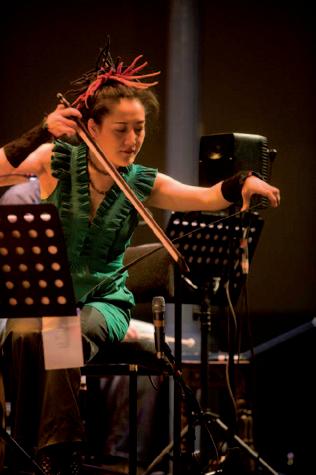

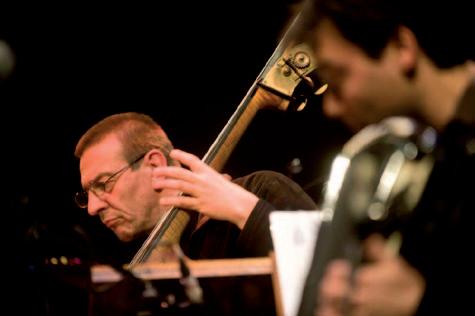
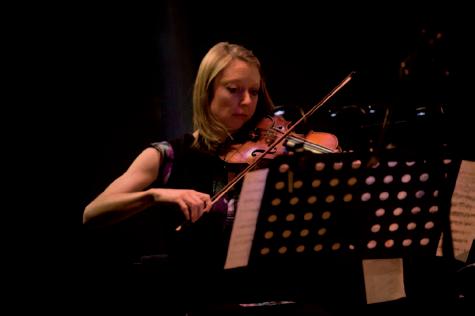
God of plunder, God of ill
Sent my love to distant hill
All to raise his drooping shares
Encasing my heart in monkey hairs.
15 Schenectady Calling Peerie Willie Johnson
Schenectady calling!
Schenectady calling!
Take these notes into the night
And run them by the Northern Lights, Transport these golden bars,
Let this music touch the stars,
And snuggle down into the noost*
Whaur Peerie Willie makes his hoose
And let this music run through his fingers, Let it touch his very soul.
Schenectady calling!
Schenectady calling!
And let the cymbals tingle in a distant ear
And the signal twinkle by the Bressay pier
In that long dark night let Eddie Lang be near This sophisticated man.
And so to Willie, Harlem speaks
His fingers painting what his soul receives
Blessed Django comes to call
Smashing down those foolish walls.
The signal flies into the night And flashes by the Lerwick lights
A nice explosion runs through his fingers
And ignites his very soul.
Schenectady calling!
Schenectady calling!
We love you madly!
Schenectady calling!
* noost = nest
17 Pius Porteous
There’s nothing like a moonlit night,
Clean shirt and whiskers and eyes that are bright;
Pius takes his heels to flight
Out in the corn field.
He’ll see her again when the moon comes out, Leave no doubt.
He heard her by the factory wall
And he purred like a chain saw at the thrill of it all;
She sang, ‘Pius, shall we tumble and fall, Here in the cornfield?’
He leaps and dances when the moon comes out, Leave no doubt.
Here comes Pius with the moon in his eyes
He loves how she sings, she loves how he flies –Best laid plan between men and mice
Here in the cornfield;
He’ll see her again when the moon comes out, Leave no doubt.
19 Green Grow the Rashes
There’s nought but care on every hand,
In every hour that passes O:
What signifies the life o’ man
An ‘twere na for the lasses, O.
Green grow the rashes, O; Green grow the rashes, O;
The sweetest hours that e’re I spend Are spent among the lasses, O.
The war’ly* race may riches chase, –
An’ richer still may fly them, O;
An’ when at last they catch them fast, Their hearts can ne’er enjoy them, O.
Green grow the rashes, O…
But gie me a canty* hour at e’en
My airms about my dearie, O;
An’ worldly cares an’ worldly men, May a’ gae tapsalteerie*, O!
Green grow the rashes, O…
Auld Nature swears, the lovely dears
Her noblest work she classes, O:
Her prentice hand she try’d on man
An’ then she made the lassies, O!
Green grow the rashes, O…
* war’ly = worldly
* canty = cheerful, pleasant
* tapsalteerie = topsy-turvy
21 Farlow
Farlow is quite a pleasant town, Though the gig may shake when the train comes round; Once a whistle cried its lonesome sound, A woman made her way. She took a bag with what little she’d need Single items for the life she’d lead, The birds all sang to help her along Away from her unceasing husband.
And the first man who addressed her Was a trapper from the mountains And she told him to be quiet With a twinkle in her eyes. The second was a ticket clerk Who sent her back to Fairfield; She turned and made the sign of the cross And she began to sing inside:
There’s love in this world for everyone Every rascal and son of a gun
It’s for the many, not the few Be sure it’s out there looking for you In every town in every state In every house and every gate With every precious smile you make And every act of kindness.
A Mennonite woman made her way up the street
With sensible shoes on her little white feet, She turned her bonnet to the western sky And listened for a whisper on the wind going by:
There’s love in this world for everyone…
23 Frida Kahlo’s Visit to the Tay Bridge Bar
We were all flooded with a scarlet light, Came through the window with the rain outside; It all went quiet and a vision appeared With a rose in her hair and a ring in her ear.
And she says, ‘Buenos dias boys, this looks like the place, Make my re-entry to the human race; Here I am and here I’ll stay Till it’s hasta la vista and I’m on my way.’
And Vince* said, ‘She was a woman to whom life had been cruel
And she lived with a fat man of the Naïve school; He liked his beer and he put it about But she truly loved him till the lights went out;’
Then she made her way up to the Pearly Gates, She saw Saint Peter, he was pumping weights; He said, ‘Hitch a lift upon this falling star, And make your way down to the Tay Bridge Bar’;
There’ll be no more lies, no more tears, No more listening through the fat mans’ ears; There’ll be no more tears and no more lies, No more looking through the fat man’s eyes.
She said she’d never been so happy in a long long time, Her mind was relaxed and her body felt fine She said ‘Put on Perdido! Tonight’s the night! I want to dance with Jimmy Howie* in the pale moonlight!’
There’ll be no more lies, no more tears…
* Vince is Vincent Rattray, a Dundee artist
* James Howie, another Dundee artist, also has a reputation as a fine dancer
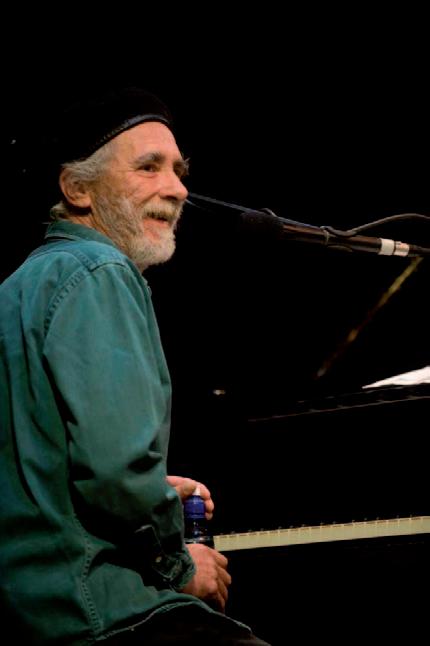
Michael Marra
Michael Marra is one of Scotland’s most prolific songwriters, and a much loved and respected figure in many artistic areas. His songs have been recorded by Frankie Miller, Kiki Dee, Leo Sayer, Fairport Convention, June Tabor, Hue and Cry, Barbara Dickson and many others.
Although predominantly known as a songwriter, Michael has worked extensively in film, theatre, radio and television. To most he is a solo performer, touring the length and breadth of Britain in Arts Centres, theatres, folk clubs and village halls. He has opened concerts for such diverse people as Van Morrison, The Proclaimers, Todd Rundgren, Loudon Wainwright 111 and Barbara Dickson and has performed with Patti Smith, Deacon Blue and Hue and Cry. In recent years he has appeared both in Washington DC and Melbourne, Australia in the show ‘In Flagrant Delicht’, a collaboration with poet and playwright Liz Lochhead, and has performed original songs with the Scottish Symphony Orchestra, the Scottish National Orchestra, Concerto Caledonia, Mr McFall’s Chamber and his own Quintet.
In theatre, Michael has written original music and has worked both as an actor and musical director with Communicado, Wildcat, Theatre Babel, John McGrath, Frank McConnell, National Theatre of Scotland and Dundee Rep. His operetta ‘If The Moon Can Be Believed’ was performed at Dundee Rep to sellout audiences.
Michael has been awarded an Honorary Doctorate by Dundee University in recognition of his contribution to the cultural profile of his home town.
Mr McFall’s Chamber
On Wednesday 20 July 1996 a string quartet of Scottish Chamber Orchestra musicians played for the first time at a venue called Legends in Edinburgh’s Cowgate for a weekly event called The Transporter Rooms. One of the organisers of that event, Alex Fiennes, had invited Robert McFall, through the latter’s teenage son George – who was at that time a regular participator in the jam session which wound up each week’s session – to bring an ensemble to the club to play contemporary classical music. Thus was born Mr McFall’s Chamber, a name which was used in publicity for that first appearance for want of a ‘proper’ name.
The ensemble subsequently recruited a bass player and pianist and, later still, a percussionist and regular vocalist, the English folk singer Dave Brady. Later that year the newly founded Bongo Club collaborated with Mr McFall’s Chamber in setting up a monthly event called ‘None of the Above’ which tried to present at least three acts from different musical walks of life during the one evening. The three acts were, furthermore, encouraged to get together and collaborate for at least a part of the evening. In this way a number of relationships were forged which, in some cases, led on to musical projects in their own right. Mr McFall’s Chamber was, in a sense, the house band for that event and the present project with Michael Marra was born in this way on the occasion of the very last ‘None of the Above’ ever, in 2006.
The group has performed music from various genres – tango, jazz, rock, cabaret – and has commissioned new works from a number of composers including James MacMillan, Edward McGuire, Gavin Bryars, Kenneth Dempster, Cecilia MacDowall, Chick Lyall, Phil Bancroft, Fraser Fifield, Matilda Brown and many more.
Discography:
Like The Milk (1999)
Discipline Global Music DGM 9809
Revolucionario (2001)
Mr McFall’s Chamber MMCC 002
Upstart Jugglers (2001) MMCC 003
Live at the Queens Hall (2005) MMCC 004 (DVD)
Music From Newcastle (2008)
International Centre for Music Studies, University of Newcastle ICMUSCD001
Gavin Bryars: Epilogue from Wonderlawn/Eight Irish Madrigals/The Church Closest to the Sea (2009)
Delphian DCD34058
Birds and Beasts – music by Martyn Bennett and Fraser Fifield (2010) DCD34085

Birds & Beasts: music by Martyn Bennett and Fraser Fifield
Mr McFall’s Chamber
DCD34085
Martyn Bennett was one of Scotland’s most innovative musicians, combining the traditional and modern, the local and the international.
A long-planned collaboration with Mr McFall’s Chamber was never realised during his tragically short lifetime. Robert McFall has put together a programme of his own sympathetic arrangements of Martyn’s music alongside original works by Fraser Fifield, another of Scotland’s virtuosic musical innovators.
‘Bennett’s multi-faceted legacy is being advanced on several fronts, and this is a very worthwhile addition’
— The Scotsman, April 2010
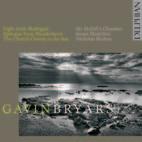
Gavin Bryars: The Church Closest to the Sea
Mr McFall’s Chamber; Susan Hamilton soprano, Nicholas Mulroy tenor DCD34058
The double bass has always been close to Gavin Bryars’ heart. His own instrument, it has also featured strongly in his music for other players – as in The Church Closest to the Sea, written for Mr McFall’s Chamber and their bassist Rick Standley. Bryars’ music straddles worlds: classical and jazz, composition and improvisation, the works on this disc moving between the lushly sensuous and the coolly laid-back as they meditate on geographical and emotional borderlands.
‘the very antithesis of Celtic sentimentalism … works jazz riffs on the double-bass against a distinctly Caledonian drone, hypnotic and insistent. Whenever I hear Bryars’ music, I want to hear more’ — Norman Lebrecht, scena.org, November 2009

Late Night Sessions: Live at the Edinburgh International Festival
Concerto Caledonia / David McGuinness with guests Martin Carthy, Michael Marra, Alasdair Roberts, Katharine Fuge DCD34093
David McGuinness writes: Four concerts at the 2009 Edinburgh International Festival offered us a great opportunity to draw on our repertoire of the last 17 years – a collection of music from Scotland through the centuries – and to invite a few special guests to add some new discoveries along the way. This CD presents a selection of favourite moments from those evenings at The Hub.
‘categorising David McGuinness's crazily mixed ensemble is pointless … Classical? Folk? Rock’n’roll Enlightenment-style? Possibly all of these’ — The Scotsman, August 2010
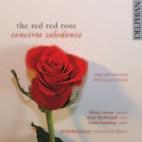
The Red Red Rose: songs and tunes from 18th-century Scotland Concerto Caledonia / David McGuinness; David Greenberg violin DCD34014
Concerto Caledonia bring their exuberant flair for early Scottish music to love songs from the time of Robert Burns, and baroque/Cape Breton virtuoso David Greenberg brings along some wild fiddling from the golden age of the Scots violin. The original version of Robert Burns’ most famous song The Red Red Rose – to a tune by Edinburgh-based Italian singer Pietro Urbani – appears here in its first ever recording.
‘Be prepared to be surprised by the reams of insights, wicked and witty, humorous and heartbreaking, exhilarating and energetic on offer from McGuinness and his leftfield outfit’
— The Herald, August 2008
